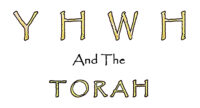1 And in those days Yoḥanan the Immerser came proclaiming in the wilderness of Yahuḏah,
2 and saying, “Repent, for the reign of the shamayim has come near!”
3 For this is he who was spoken of by the naḇi Yeshayahu, saying, “A voice of one crying in the wilderness, ‘Prepare the way of 𐤉𐤄𐤅𐤄, make His paths straight.’ ”
4 And Yoḥanan had a garment of camel’s hair, and a leather girdle around his waist. And his food was locusts and wild honey.
5 Then Yerushalayim, and all Yahuḏah, and all the country around the Yardĕn went out to him,
6 and they were immersed by him in the Yardĕn, confessing their sins.
7 And seeing many of the Pharisees and Sadducees coming to his immersion, he said to them, “Brood of adders! Who has warned you to flee from the coming wrath?
8 “Bear, therefore, fruits worthy of repentance,
9 and do not think to say to yourselves, ‘We have Aḇraham as father.’ For I say to you that Elohim is able to raise up children to Aḇraham from these stones.
10 “And the axe is already laid to the root of the trees. Every tree, then, which does not bear good fruit is cut down and thrown into the fire.
11 “I indeed immerse you in water unto repentance, but He who is coming after me is mightier than I, whose sandals I am not worthy to bear. He shall immerse you in the Ruaḥ ha’Qodesh and fire.
12 “His winnowing fork is in His hand, and He shall thoroughly cleanse His threshing-floor, and gather His wheat into the storehouse, but the chaff He shall burn with unquenchable fire.”
13 Then 𐤉𐤄𐤅𐤔𐤏 came from Galil to Yoḥanan at the Yardĕn to be immersed by him.
14 But Yoḥanan was hindering Him, saying, “I need to be immersed by You, and You come to me?”
15 But 𐤉𐤄𐤅𐤔𐤏 answering, said to him, “Permit it now, for thus it is fitting for us to fill all righteousness.” Then he permitted Him.
16 And having been immersed, 𐤉𐤄𐤅𐤔𐤏 went up immediately from the water, and see, the shamayim were opened, and He saw the Ruaḥ of 𐤉𐤄𐤅𐤄 descending like a dove and coming upon Him,
17 and see, a voice out of the shamayim, saying, “This is My Bĕn, the Beloved, in whom I delight.”
